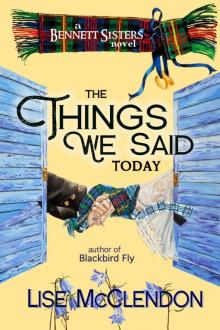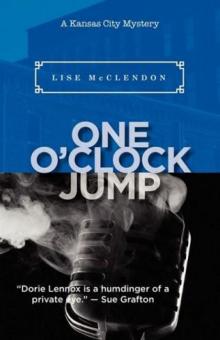- Home
- Lise McClendon
Swing Town Mysteries Dorie Lennox Box Set Page 4
Swing Town Mysteries Dorie Lennox Box Set Read online
Page 4
They stopped at the door to room 322 in the shadowy hallway. A janitor washed the floors with a bucket and string mop. A kitchen worker was picking up trays.
“I’ll be back in fifteen minutes. Don’t tire him out.” Lennox eased into the room, passing a white-haired man with a bandaged face. On the other side of the curtain, an oxygen tent enveloped the pale figure. He looked so small inside. She wrung her hands on the iron bed railing.
“If it isn’t the oomph girl.” His voice sounded weak and strange through the transparent sheeting of the tent. Below his shoulders, the tent’s raw canvas was tucked into his bedclothes. His face was blurred, but he wiggled his fingers, pointing to a chair. “Sit down.”
She sat, unable to think of what to say.
“Don’t give me that creepy look, kid,” Amos said. “This isn’t the first time, and it won’t be the last.” He gasped a little air. “Used to happen every couple years; then it slowed down. It’s been five now, but I knew it was coming.”
“You might have warned me.”
“Would it have made any difference?” He tried to sit up against the pillows. “So, you called the ambulance? After I said I hated the beasts. Well, I don’t blame you.”
“I drove you myself.”
“Last thing I remember, I was on that sofa.”
“We carried you to the car.”
“We?”
“At the law firm. A lawyer. He’s”—Amos wiggled his eyebrows, waiting—“from Atchison.”
“Old swain?”
She’d never told him what had happened, although he knew she’d stolen the car and gone to the girl’s school in Beloit for it. She wouldn’t be following Roger and Willard into uniform. No chance of that.
“No.”
“You sure about that?”
“How are you feeling?”
“Like hell. But a familiar hell. Three pints of blood and some forced air, and bingo. Back to normal. But I don’t want to talk about it.”
That she understood. She relaxed a little. She would have to tell him about Vanvleet’s request, and her refusal. Maybe it could wait.
“So who is this lawyer? What’s the story?”
“Just somebody from Atchison.”
She felt his eyes examining her face and wished he didn’t always do that.
“Well, I’ll listen to my wheezing and try to wheedle a sponge bath out of that pixie nurse. But wait. Is it a sob story? Because if it is, I’ll ring for extra Kleenex.”
She sat back, smiling at his efforts. “No, it’s not a sob story.”
She hadn’t told anybody about Weston, about what had happened in Atchison, and she wasn’t going to start now. She jutted her chin then tried to pretend she hadn’t.
Amos watched her face, difficult through the haze of the oxygen tent. There was that sad purple shadow creeping in around her eyes, and its quick quenching.
“So, does this swell lawyer have a name?”
“Louie Weston. The old man seems very keen on him.”
“Does he? What else did the little Hitler say?”
She opened her hazel eyes wide. “They say on the radio that France and England are going to declare war.”
He lay very still under the tent. He felt the sinking dive of that last survey flight, the wind in his ears. He saw the soft blue flowers of his mother’s garden, heard the whistling whine of the bombs, felt the stiff, fragrant paper of Eugenia’s last letter in his hands.
“I knew it. I knew it.”
“They say they’re going to start moving the children out of London. They’re afraid it’ll be bombed.”
“They’ll bomb it. Of course they will. Blasted sons o’ bitches.”
“Amos, please. Breathe easy.” She patted his arm. “I shouldn’t have said anything.”
“Can’t keep a bloody war a secret.” He resettled himself on the pillow. “You don’t know how it is, you don’t want to know. It’s hell.” He stopped, tried to clear out the jumble of bad memories. He’d had practice; he could do it. “Never mind. What happened with Vanvleet?”
“The nurse said not to stay too long.”
“She’s not back. Tell me what the old man said.”
“Can’t we talk about it tomorrow?”
He glared at her.
“All right. He wants me to keep looking into Iris. Check out her apartment, the bar where she worked, things like that.”
“So you start tomorrow.”
“There’s no point. She’s dead.”
“If Vanvleet says there’s a point, there’s a point. If he says the sky is down and the land is up, you say, ‘Yes, Mr. Vanvleet.’ He’s the one puts food on the table. He’s the one paid my hospital bills three times. Three times, and it was over two hundred dollars every time.”
“You said yourself that they aren’t on the level. Did you see an ounce of regret in that back-stabber? Georgie never cared a tinker’s damn about her. It’s all some game for them.”
“I know that, you know that, they know that. So we’re square. Clients never give you the full bill. If they were upstanding citizens, they’d be checking out their own dames. Or meeting a better class of women.” He took a breath or two. “Look, they want some distance between them and Iris Jackson. You are the distance.”
“I know you feel some loyalty to him, but for me, I just don’t see how I can do it.”
“I’ll tell you how. You go around to her apartment, talk to the landlady, pick through her knickers. That’s what we do. It ain’t pretty and sometimes it ain’t nice.”
He hadn’t meant to speak so harshly to her, but the war news had provoked him. How dare they send soldiers out again? Hadn’t he come over here, where only the occasional old blighter without a leg reminded him of all of it? Where his daily hacking could be passed off as a simple lung condition? Where he could cough in peace, letting each day of agony pay his penance to Eugenia?
Lennox turned back to the window. She felt uneasy around Amos suddenly, guilty she couldn’t tell him about Louie Weston. He was usually so breezy, so quick to joke, or to give easy instructions and tips. She had never seen him so angry. And so loyal to Vanvleet. For three years, she’d been wanting to be a full partner, and now, almost overnight, Amos had no one else.
He looked so helpless under the tent. “He paid your bills?”
“Without my knowing. Okay, he’s mixed up in shady deals, no doubt about that. With clients like Gorgeous Georgie, you know he is. But for the last ten years, he’s been the butter on my bread. Hell, he’s been the bread on my bread. You think anybody else’d hire an old warhorse barking up his lungs?”
The sound of oxygen whizzing through nozzles and gauges filled the room. Behind the curtain, the white-haired man began to snore.
“Look, lass, haven’t you ever lost somebody and you didn’t know why? Sometimes, there aren’t reasons, it’s just life. But sometimes, you just have to find out.” He closed his eyes, sighed. “Iris is one of those.”
She thought of Melva, who had jumped into the Big Muddy because nobody cared. And of Tillie and her sweet voice. Just life, losing Tillie. Those old imagining games—what would Tillie have looked like at eight, twelve, fifteen? What would she have read? How would she fix her hair? Her palms itched with questions.
Lennox shook her head to clear out the memories. This business seemed so personal to Amos. “I didn’t know,” she said. “About the hospital bills.”
But Louie Weston. She didn’t want to talk to him. Didn’t want to be reminded every time she saw his face that she had stolen the car as much for him as for Arlette that night. Dear Arlette, still grateful. She thought stealing the car was all for her, only to get her to Kansas City for the abortion. She owed Dorie her life, her future. How many times had Lennox had to smile and nod and take the credit?
But she had stolen the car, driven to the back-alley butcher with his filthy hands and greasy breath, for Arlette and for Louie. It had seemed so important then that he have his clean, pros
perous life. And he had, hadn’t he? Yale, law school, money, country clubs. His life was cake. The crush she had on him at fourteen. She had grown up on the spot, helping Arlette survive the bleeding. More growing up in the shame and trouble she’d brought on Verna, in the soul-starving Beloit girl’s school—then losing Tillie. It was all too connected.
Amos cleared his throat. “Not this old boyfriend, then, is it? Seeing him around Vanvleet’s won’t be a problem.”
“He’s not—he’s not an old boyfriend. Anyway, that was years ago.”
How Amos read her mind scared her; it was uncanny. She had to work harder, stay calm, not think about the past.
“So you’ll take the job. Just sniff around a wee bit. Shouldn’t be more than a day or two. Then I’ll be out of here and fit as a fiddle.”
She saw his eyelids dip, then struggle open again.
“Of course I’ll do it, Amos,” she said, standing. She thought then of all the things he had taught her, the chances he’d given her, and felt ashamed she’d argued. “I’ll get Helen. You get some sleep.”
“Righty-o. Get a wiggle on home.”
Another humid night had descended, trapping the fetid city air. Saturday night, and she didn’t have to work. Free, white, and twenty-one, as the boardinghouse girls said. Tonight, she could do anything, see The Wizard of Oz, do the Lindy at Sni-A-Bar Gardens, drink whiskey neat in a jazz club over the strains of a plaintive saxophone.
In the car, she felt aches all over her body. Reliving the bad old days of Louie and Arlette, seeing Amos in pain, she felt worn down. She drove back to the boardinghouse, climbed the shadowed stairs. A cool bath and early to bed. She hoped the piano player was as tired as she was tonight.
On the third floor, outside her door, the hair on her neck prickled. The lock had been jimmied; the door stood ajar. She looked around the dark hallway, then stepped to the wall and pushed the door open.
The light by her bed was on, casting a yellow glow at the mess of bedding, mattress askew, cupboard doors gaping, books and clothes strewn on the floor. Lennox pulled out her blade, switched it open silently.
“Who’s there?” she said loudly. She took a step into the room, looked around, and dropped her arm. Whoever had tossed her room had taken a powder.
She reached back to close the door, when it came at her in a rush, smashing into her forehead and sending her backward to the floor. A foot kicked her in the ribs. She groaned. A heel caught her back as she rolled into a ball.
The blade was still in her hand. She swung wildly, pulling her legs around. The attacker kicked her hand, the pain loosening her grasp. She heard the blade clatter to the wooden floor and felt the boot against her jawbone, pressing her face into the floor. She tried to grab something, but just trying to breathe with her windpipe crushed against the wood made black spots appear in front of her eyes.
The laugh was high-pitched. “Watch your step, Miss Snooper. Because I’ll be watching you. Everywhere you go.” The voice, surprisingly, a throaty female one.
“Who—” The boot cut her off. Blood pushed against her eyeballs.
“I’m talking.” The familiar sound of her switchblade closing, then opening again. “What is this—your nail file? You are so far out of your league, kitten. Now listen. Tell the limey to stay away from Edna. Savvy? You can’t stop me, so don’t even try.”
Another swift kick to the kidneys shot pain up Lennox’s back. She closed her eyes. Footsteps clattered in the hallway and down the stairs.
Lennox rose to her hands and knees, gasping for air. The blade was stuck into the floor beside her. She staggered to the head of the stairs. Taking them two at a time, she swung around on the railings at the landing on the second floor. At the bottom, Lennox hit the oak floor of the front hall and slid. Her knee collapsed under her. She fell in a clumsy heap. It didn’t matter. The figure was gone, out the door into the night.
She lay on the floor, cursing, as Mrs. Ferazzi came out of her room under the stairs in a pink robe. “What is it, Miss Lennox?”
“Damn, Mrs. F. A woman.”
Mrs. Ferazzi dusted her off. Lennox felt the knot on her forehead and gingerly tried putting weight on the knee. Mrs. F. was fussing, asking questions. She patted Lennox’s shoulder and offered to help her back upstairs.
“I’m all right, really.” Lennox’s voice sounded scratchy. She’d made it to the first step, hanging on to the railing.
“You shouldn’t try to be so brave all the time, dear. Running after a burglar like that, you coulda been killed.”
“Don’t worry about me,” Lennox muttered, struggling up another step.
“Oh, but I do, dear, I worry about all my boarders. My family, that’s how I think of y’all.”
On the third step, Lennox winced from the pain in her ribs. If I could just lie down, she thought, then remembered all the stairs between her and her bed. She’d be damned if she’d let Mrs. Ferazzi tuck her in. Another mother was the last thing she needed.
“Stay there now, young jouster!”
The twins bustled down the stairs side by side, wearing identical green chenille robes and fuzzy slippers. Their gray hair was down, in single braids to their waists. Three mothers—how could she fight it? They took each side of Lennox and piloted her up the stairs. They gasped at the switchblade stuck in the floorboard. Lennox leaned off the bed, pulled it out, closed it, and tucked it under the pillow.
After settling her on the bed, one said excitedly, “We saw the whole thing.”
“No, we didn’t, sister. We only saw that person run out of your door, and you run after him, Dorie.”
“Did you get a look at her?”
“Her?” they said in unison.
Lennox lay back against her pillows. “Did you see her come up?”
Norma and Nell shook their heads. “We went to bed early.”
“And read Miss Christie.”
“Never heard a thing?”
“We wish we had. We could have helped you, Dorie. Does your leg hurt awfully?”
“I’m glad you didn’t come out. If you see somebody around my room again, stay behind your door.”
The twins made ominous faces at each other. Norma volunteered to get an ice bag. Nell sat on the bed and talked about the Agatha Christie story, about a village parson and a stranger and an odd smell in the tea. A few minutes later, ice bag in place, Lennox shooed them off.
The room was a mess, clothes dumped out of drawers, books from under the bed strewn across the floor. What had the woman been looking for? Lennox glanced at the open cupboards, saw the coffee can where she kept her extra money, when there was some, and saw it tipped, empty. Two dollars and seventy-five cents, up in smoke.
Setting the lamp upright, she perched it on the nightstand and kicked off her shoes. The knee had been worse. All she’d really done was to twist it. She felt the ice numbing it and eased down on her sore back. She lay listening to talk on the street below, laughter, mumbling. She got up after a minute, found aspirin, hopped to the sink for a glass of water.
She put a record on the Victrola, Lester Young with Billie Holiday, and lay in bed smoking Luckies. Her hands shook. The woman had taken her blade in nothing flat. But who was she? A burglar out for two dollars and change? Not likely. Did she work for Georgie? He didn’t trust her any more than she trusted him. But would he actually break into her room—and for what?
She lit another cigarette and sat on the edge of the bed, rearranging the ice. The woman had come to give her a message, that was it. But who was Edna? Somebody the so-called limey was investigating? Why not give Amos the message himself? She cringed, thinking she was the easier target, easier than a decrepit old soldier in an oxygen tent.
If the woman had broken in to give her this message about this Edna person, why had she tossed the place? Was this message business a false trail, something to take her attention away from what was missing in the room, whatever the intruder wanted so much that she’d baldly tromped up the stairs and bro
ken into a room in a public hallway?
The photographs? The film was at the office; she’d taken the roll there during a bratwurst run for the nurses. But the thief didn’t know that. Oh hell, the pictures weren’t going to show anything anyway.
She lay back again. The more she thought about the attacker, the angrier she got. The words the woman had said, her sneering tone, put a chill in her. “You are so far out of your league, kitten.” Lennox ground her teeth. She’d show her, whoever she was. Out of my league, my eye.
A cold shiver passed through her. Enough. She turned her mind to Iris Jackson. A little sister. There was a hot tip. It made her sad to think about Iris, but she had to. She’d promised Amos.
That night at the Muehlebach, all dressed up. Iris, with her hair like Jean Harlow, now dead like Jean. Lennox and Amos had watched her work the room like a quiff, then laugh at the men’s whispered suggestions. A satin dress, gold earrings, shimmering hair. Vanvleet swore she wasn’t a hooker, that George had too much class. Georgie and class, that was a good one.
She turned out the light, pulled up the covers, and listened to Lady and Lester sing about things that shouldn’t have happened.
FOUR
LENNOX RANG THE BELL at the house on Janssen Place. The porch, bigger than her room in the boardinghouse, was stuffed with wicker furniture and yellow begonias. A headache from last night’s thumps had been eased by aspirin, but her knee and back still ached when she moved. She fingered the envelope with the eight-by-ten prints. Her hands smelled like chemicals from the darkroom.
The Vanvleet mansion was one of only four houses that hadn’t been converted to apartments on this once-proud street. The manses butted up to Hyde Park’s trees and green swards, flanked with stone gates and fountains on the short but elegant street. The Vanvleet’s three-story brick pile had been built before automobiles, with a carriage house and covered side entrance. To Lennox’s eye, it was a guise, a pretense of respectability as corrupt as the old man who lived there. Cynical thoughts from an ungrateful girl, she thought, shaking her head on the porch.

 Blame it on Paris (Bennett Sisters Mysteries Book 7)
Blame it on Paris (Bennett Sisters Mysteries Book 7) Birds of a Feather: 3: Fly the Nest (Bennett Sisters Mysteries Book 16)
Birds of a Feather: 3: Fly the Nest (Bennett Sisters Mysteries Book 16) Blame it on Paris
Blame it on Paris The Things We Said Today
The Things We Said Today Bennett Sisters Mysteries Volume 5 & 6
Bennett Sisters Mysteries Volume 5 & 6 Bennett Sisters Mysteries Box Set 2
Bennett Sisters Mysteries Box Set 2 Painted Truth
Painted Truth One O'Clock Jump
One O'Clock Jump The Bluejay Shaman (Alix Thorssen Mystery Series)
The Bluejay Shaman (Alix Thorssen Mystery Series) Swing Town Mysteries Dorie Lennox Box Set
Swing Town Mysteries Dorie Lennox Box Set Give Him the Ooh-la-la
Give Him the Ooh-la-la Blackbird Fly
Blackbird Fly All Your Pretty Dreams
All Your Pretty Dreams Nordic Nights (The Alix Thorssen Mysteries)
Nordic Nights (The Alix Thorssen Mysteries)